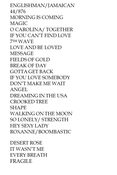
Selected Miscellaneous Shows
Sting and The Florida Orchestra rock the Mahaffey...
Man, can that Sting sing - and the orchestra finds new dimension in his songs.
Is there anyone cooler than Sting?
Some singers don’t dare the ‘C’mon sing along with me now’ moment till late in the concert after the crowd’s loosened up a bit.
Not Sting.
All he had to was raise his hands during his first number, “An Englishman in New York,” beckon gently like a conductor asking for a little more volume, and sure enough, the tuxed and evening-gowned crowd at the sold-out Mahaffey jumped right in on cue.
They were already in a good mood, of course, gathered to celebrate the Florida Orchestra’s 50th. The board chair Janet Paroo had just announced the gala’s record fundraising total ($1.5 million-plus) and Music Director Michael Francis was his usual charming British self, joking that he and Sting had debated before the concert which of them should take the blame for “the English weather.”
Then, well, there was Sting. Slim as a rod in a sharp three-piece black suit with tux shirt and loosened polka dot tie, his skin glowing, his age (66) irrelevant, he can still howl those high notes but also deliver a ballad with eloquent simplicity. His physical style is minimalist but sexy, contained until the music demands a clap, a finger snap, a hand to the heart, a hip swivel, head thrown back. The effect is not so much calculated as a portrait of an artist fully in control of what he’s doing.
The line he got us to sing along to - a lyric inspired by the unapologetically queeny writer Quentin Crisp - was “Be yourself no matter what they say.” And Sting, in his 40-year, Grammy-winning, multi-million-selling career, has been resolutely himself. Yet at the same time he’s explored multiple musical identities - including Symphonicities, the 2010 collaboration with the Royal Philharmonic from which many of this concert’s arrangements were taken.
Not every pop/rock songwriter’s oeuvre would shine in an orchestral setting, but with Sting the marriage makes perfect sense. The incantatory power of songs like “Every Little Thing You Do Is Magic” and “King of Pain” was amplified by the power of the orchestra. In others, the sweep of emotion evoked by the ensemble created an aura not necessarily present in the original version.
Take “Roxanne,” for instance. In the original, there’s piercing anguish in Sting’s delivery of the lyric, fear for her and urgency that she get off the street before it’s too late. In the orchestral setting, the feeling is less urgent, more empathetic - a love song meant to soothe. Both versions work, but TFO’s performance and Sting’s graceful phrasing were inarguably gorgeous, suggesting a soundtrack to an epic movie romance yet to be written.
There was a hint of moviedom, too, in the arrangement for “I Hung My Head,” Sting’s venture into country music - a song, he told us proudly, that was covered by Johnny Cash. A stark account of an accidental shooting, it’s more lone cowboy on the plains than thundering hooves on the horizon - think Hell or High Water, not Magnificent Seven - but it gets the full-on galloping orchestral treatment here, to confusing effect. Still, have to hand it to Sting; eyes narrowed, hoisting an imaginary rifle, damned if he didn’t seem like he could make a credible movie cowboy - Richard Widmark with a British accent.
One reason Sting’s singing is so effective is that, like a good actor, he connects deeply with the words. He wrote the beautiful song “Fields of Gold,” he told us, upon seeing the 16th-century “ruin” near Stonehenge that his wife, Trudie Styler, bought without him seeing it first. Fortunately, he loved it on sight, and was struck by the fields of barley that surrounded it. When he sung “Many years have passed since those summer days among the fields of barley/ See the children run as the sun goes down among the fields of gold” - the warmth in his eyes as he sang that verse, as if seeing his children again in those fields, was tremendously moving.
Here, and in the evocative numbers from his Broadway musical inspired by his sea-going forefathers, The Last Ship, the orchestra was exquisitely attuned to shifts in mood, from contemplative piano behind the sweet proposal of “What Say You Meg?” to the ensemble’s mountainous crescendo behind the title song’s lyric, “The mountain of steel makes its way to the sea.” Throughout the concert, individual players got a chance to shine in solos, including Natalie Hoe on clarinet and James Connors on cello, as did Sting’s own very tight 4-piece band led by Rob Mathes, who did many of the arrangements (he produced Symphonicities).
And just to be clear on two things: This orchestra rocked, and Sting is still a rock star. The man has lungs: Every breath he takes must be substantial because he held some notes for an indecently long time; the “on” in “Now I know my love for her goes on” went on and on. “King of Pain” was downright inexorable, not to mention irresistible, and by the time he got to “Desert Rose,” there was a whole lot of shakin’ going on at the Mahaffey. Everyone in the audience was standing, including the orchestra and the band, the musicians were all playing at a furious pace, and it all felt more like a revival than a concert, with Sting as the preacher.
His final encore brought the crowd to a hush: the heart-rending “Fragile,” with its famous repeated line, “How fragile we are ” - a song he has sung in concerts on the evening of the 9/11 attacks and at the reopening of the Bataclan in Paris in 2016 a year after the terrorist attacks there. Hearing it again was a powerful reminder - and an expression of the fragility and force that makes Sting such a mesmerizing artist.
(c) Creative Loafing Tampa Bay by David Warner





